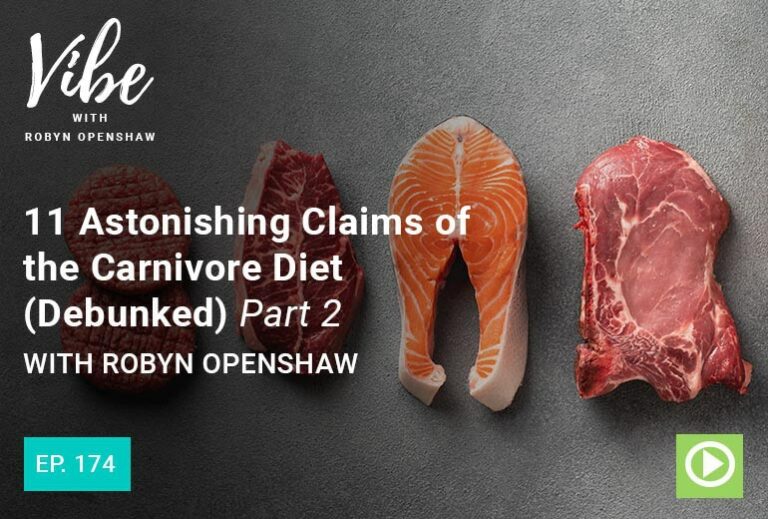Ep. 174: 11 Astonishing Claims of the Carnivore Diet (Debunked) Part 2 with Robyn Openshaw

Podcast: Play in new window
This concludes my reading my blog post about the 11 false, even ridiculous, claims of the latest diet fad, the Carnivore Diet–complete with direct quotes from its proponents, including a very sick young girl, an insect expert, a couple of bodybuilders, and a psychiatrist.
LINKS AND RESOURCES:
Read the Blog Post
EPISODE HIGHLIGHTS:
- [01:01]: Triggered. Robyn explains how some healthy foods and gut and liver problems are connected.
- [07:08]: Argument Six. Robyn debunks argument 6 of the carnivore diet.
- [09:52]: Argument Seven. Robyn explains and refutes argument 7 of the carnivore diet.
- [13:39]: Argument Eight. Robyn explains and debunks argument eight of the carnivore diet.
- [17:27]: Argument Nine. Robyn debunks argument nine of the carnivore diet.
- [20:30]: Argument Ten. Robyn explains and refutes argument ten of the carnivore diet.
- [25:18]: Argument 11. Robyn explains and debunks argument 11 of the carnivore diet.
TRANSCRIPT:
This transcript has been edited for clarity. Robyn: Hey everyone. Robyn Openshaw here, and welcome back to the Vibe show. We are picking up in the middle of the blog post The 11 Astonishing Claims of the Carnivore Diet. If you haven’t heard the last episode, make sure you go back and listen to that. Here we go. Misinterpreting Inflammatory Triggers: When healthy foods are triggers (which is becoming an epidemic), the functional medicine consensus is that there’s a significant gut and liver problem that needs to be resolved. Removing the offending foods whose compounds cause the inflammation will reduce symptoms, but a metaphor may be useful. You can’t just put duct tape over the warning light in your car’s dashboard. You have to address the bright red engine light. If the all meat diet is a therapeutic diet to allow Mikhaila Peterson’s gut to heal, to be able to return to what science has repeatedly shown is a balanced and healthy diet for life, then great. I hope that Mikhaila Peterson is in the care of a good functional medicine doctor looking into the root cause, but there is zero evidence to show that eating all meat will serve Ms. Peterson well for life. She’s also at risk for parasites as there are 1000 larva in the average square inch of beef. Some experienced functional medicine doctors have said they’ve never seen a case of cancer where there weren’t parasite overgrowths involved. I have found only people who have been on the diet for a few months making the claims of disease reversal. If you have fewer antibodies in the body for a time having removed offending foods, that is wonderful. If we think about the long term rather than just the short term, removing all fiber and most of the micronutrients from your diet puts you at massive risk for colorectal and breast cancers, gut disease. Unfortunately, it also puts you at high risk for advancing and compounding autoimmune disease when you do not treat the root cause of the autoimmune disease. Cascading additional autoimmune diseases are usually what comes next. Let’s go on to the number five astonishing claim of the carnivore diet: Plants are toxic and cause disease. Here’s Dr. Saladino’s quote, “Plant molecules do other toxic things in our bodies. Curcumin and piperine are maybe not as good example as sulforaphane. The sulforaphane in broccoli seeds can cause thyroid disease. It’s actually not incredibly difficult to make yourself hyperthyroid by eating broccoli sprouts.” My response. Sulforaphane is one of the most celebrated nutrients in the entire plant kingdom and is part, but not all, of the reason that the crucifer family is so powerfully anticancer as dozens of studies show. Sulforaphane is one of the most frequently studied plant-derived organosulfur compounds. A comprehensive compendium of studies found these wide range of biological effects: antioxidant, anti-microbial, anti-cancer, anti-inflammatory, anti-aging, neuroprotective, and antidiabetic. The flawed case against anti-nutrients: Dr. Saladino may be confused thinking that goitrogens in crucifers are why cabbage, broccoli, cauliflower, et cetera, contain an anti-nutrient that some say interferes with thyroid function. Anti-nutrients are substances found in plants that either reduce the availability or adversely affect a plant’s nutrients. Research indicates that low levels of anti-nutrients may actually be beneficial and play a part in the prevention of chronic diseases such as cancer, cardiovascular diseases, and diabetes to name a few. Unless you’re going to binge on broccoli, it would be very difficult to eat enough veggies to produce a toxic effect due to anti-nutrients. I’ve written before about the research that shows that anti-nutrients are not at all toxic to humans. I link to that extensive blog post as well. There are also dozens of other compounds in these plant foods that are well documented to be protective for the thyroid. While I agree that broccoli seeds have concentrations of nutrients such as sulforaphane, I cannot find any scientific evidence to support Saladino’s claim that eating these seeds can cause a thyroid condition. In fact, a recent study published in biomedicine and pharmacotherapy found that the levels of thyroid hormones remain unchanged after ingesting broccoli sprouts. The sprouts were actually found to have a protective effect against sulfa dye meth, oxen induced thyroid damage. In animals with hypothyroidism, broccoli sprouts were found to exert a beneficial influence. Plants do, in fact, contain anti-nutrients. The fact is the entire premise of the carnivore diet is scaring people about eating all plants. These promoters miss the burgeoning evidence that the same foods that contain salicylates, oxalates, goitrogens, phytates, lectins, and other anti-nutrients also have dozens of other protective compounds. In fact, as Dr. John Douillard explained in my podcast interview with him, many researchers theorize that anti-nutrients have a positive role in human metabolism and health. [Researchers] are discovering that small amounts of bacteria, yeasts, and even parasites thought to be bad, have a hormetic or mild positive stress stimulating immune function role in our health. Number six argument of the current of our diet: Humans evolved to eat primarily probably only meat. The argument was put by Mikhaila Peterson on Joe Rogan’s podcast. She said that when humans broke off from primates, they became hunters and gatherers. Therefore humans in 2020 right now should eat all meat and no plants. My response, in fact, when humans broke off from primates and evolved, they retained the extremely long 30 to 35-foot-long gastrointestinal tract. We also have never developed the sharp canines that are designed to rip and tear apart flesh. Humans are not built like any carnivore, and that’s because we have never been carnivores. Carnivorous eating with a human GI tract. While you can make a case for our ability to be an omnivore. The human digestive tract looks like those of herbivores all over the world, and it looks like no carnivorous animal anywhere. While the human body is astonishingly adaptable to a variety of diets, the GI tract has not gotten shorter, such as in the case of cats who have a straight GI tract going from mouth to anus. Rather, we have at least 30 feet in our gastrointestinal tract packed into a very small space in our abdomen. Followers of the paleo diet argue in favor of even heavier meat eating than the standard American diet because that’s what paleolithic man ate. The diet has fallen from favor in most circles due to clear evidence from anthropologists that the many colonies of paleolithic man ate mostly plants. If they ate meat, it was seasonally and once a day at most — when they could obtain it. Ben Greenfield, a health and fitness expert who underwent a modified carnivore diet, which included some root vegetables, berries, seeds, nuts, and other foods recently addressed the theory that our ancestral populations were exclusively carnivorous. He cited several groups that while consuming meat also partook in an assortment of vegetables. Here are examples of just a few. Number one, the nomads of Mongolia included tubers, roots, seeds, berries, wild onions, and garlic in their diet. Number two, the Canadian Inuit dined on berries, lichens, and sea vegetables, which accompanied their whale, walrus and other meats. Three, the Sioux of South Dakota ate wild fruit, nuts, and seeds as well as their Buffalo. Number seven claim of the carnivore diet: You can get all your nutrients from eating animals. You just have to do it right. The argument as put by Paul Saladino on Ben Greenfield’s fitness podcast is you don’t actually have to get micronutrients from plant foods as long as you eat the whole animal nose to tail. [This is] including organ meat, connective tissue, tendons, bones, the face, and the brain. You don’t need flavanoids. In fact, they may be harmful. If you eat nose to tail, you’ll get plenty of vitamin C. My response. I’m pretty sure that Nobel Prize winning Linus Pauling is rolling over in his grave. Saladino believes that we can get all the vitamin C we need from an animal’s liver. If you’re an Intuit [you would get vitamin C] from whale blubber. The simple solution? Just eat an animal nose to tail, we may need to add a harpoon to our hunting supplies. Vitamin C degrades in heat, so you will have to eat your liver raw. Even then, it is not a rich source of this important nutrient that when deficient has been linked to scurvy, dry and damaged skin, painful and swollen joints, weak bones, and a poorly functioning immune system. In addition, raw liver is a significant infection source of toxocariasis, which is a parasitic roundworm. What other pathogens may be lurking in raw liver? E. coli, Salmonella, and other bacteria, viruses and parasites. Eating nose to tail is impractical for micronutrients. Dr Saladino claims that all the micronutrients you need are found in animal products despite evidence to the contrary. Mostly he relies on the argument that you don’t need some of the classes of micronutrients that the scientific literature says are disease preventative for humans. While wild game may be a healthier option, very few people have access, and even fewer people have the stomach to eat the connective tissue, organs intestines, anus, skin, face, bones, and other parts of the animal, which according to some in the all meat movement is vital in order to obtain all the nutrients you need from meat alone. Others in the carnivore diet movement just eat steaks and chicken and eggs and the like and ignore all of that human physiology and meat eating. While I agree that connective tissue and organs may be nutrient dense, ancient man ate animal products in their raw state and carnivorous animals still do. We do not have the pointed canines to tear raw flesh, nor the serrated molars that tear instead of grind nor the very acidic stomach pH which can kill the pathogens found in raw meat. In our modern world of toxic chemicals, animal flesh has up to 10 times more glyphosate and other herbicides, pesticides, insecticides, and fungicides than plant foods. Even when those plants are grown conventionally or sprayed and not washed. That’s because herbicides and the other ides concentrate in animal flesh. Most of those in the carnivorous movement are eating 100% cooked dead flesh, which no other animal species or human population has ever done. Humans do not have the endogenous enzyme manufacturing ability to fully digest cooked animal products. People who eat meat must rely on high fiber plant foods to help move the meat through the colon. Let’s do number eight. The argument is plants are a last resort food. Let me quote Paul Saladino again. He said on Ben Greenfield’s podcast, “Plants are inferior foods that you should eat only when you can’t get meat.” My response, plants take 5% of the earth resources versus the same weight in animal products. 2,500 gallons of water are needed to produce one pound of beef. Livestock or livestock feed occupies one third of the Earth’s ice-free land. Animal agriculture is the leading cause of species extinction, ocean dead zones, water pollution and habitat destruction. You get the idea. Now consider the fact that some of the proponents of the diet talk about eating three to four pounds of beef every day. That could be up to 10,000 gallons of water that had to be spent to create that four pounds of beef. This means that a person on the carnivore diet consumes at least 20 times more of the Earth’s resources than those of us who are eating a whole food plant-based diet. I did not find any of the carnivore diets proponents addressing this issue, so I add it here. To be honest, the above heading or that argument that plants are a last resort food is so ludicrous. I almost hate to waste my time debating it. Study after study after study shows that it is far better to get your protein as well as the other nutrients from plants. Think about it. What sounds better for you? Beans or bacon? Pound for pound, plants pack way more nutrients into far fewer calories and offer the added benefit of fiber. Oh, I forgot. According to present day carnivores, we don’t need fiber either. Meta analyses show that people who eat plants versus animals tend to live longer, healthier lives. The Oxford Cornell project findings, one of the most comprehensive studies ever conducted on human nutrition prove the importance of the plant-based diet. The Oxford Cornell project yielded over 800 statistically significant findings from studying 6,500 people in China, half of whom natively ate 20% animal protein like the average American does and half of whom ate 5% animal protein like all of the blue zones do — the longest living people on the planet. Those with high protein diets had astronomical rates of cancer and other disease similar to Americans who also now natively eat 20% animal protein on average. Those eating very little animal products had extraordinarily low rates of cancer, heart disease, and autoimmune disease. The research by Oxford and Cornell is the type of data that highlights long term outcomes over the course of a lifetime what happens. Consider that versus “What do my lab results say three weeks or three months after ditching my standard American diet and eating all meat?” The massive human study was conducted after very similar results were discovered in rodent populations fed the same percentages of protein. While every carnivorous marketer or anyone with a vested interest in the meat and dairy industries has criticized or dismissed the collaborative research by Oxford and Cornell, led by T. Colin Campbell, PhD, the fact remains that researchers all over the world repeated Dr. Campbell’s animal studies with consistent results. Number nine: Studies that show plant foods to be nutritious were done incorrectly. The argument is put by this quote by Scott Myslinkski of the Carnivore Cast podcast. He says, “Nutritional research is a terrible form of science, and we should really look at anecdotes.” This quote by the host of the podcast Carnivore Cast summarizes Dr. Sean Baker’s assertion that quote, “The plural of anecdote is data.” Dr. Baker is a non-practicing orthopedic surgeon and bodybuilder and weightlifter as well as a proponent of the carnivore diet. Baker’s many opponents — He says that he receives hundreds of messages daily some of which are crazy vegan stuff from vegan propagandists point to the worldwide positive long term outcomes that are attributed to communities who eat mostly a whole foods plant based diet case study evidence versus end point data. Baker’s method to dismiss this is to say that all nutrition science is flawed and that we should instead look at 90 day anecdotal or case study evidence. I agree that many who stopped eating the standard American diet and eat any form of a healthier diet — virtually all diets are healthier than standard American diet of mostly processed food and animal products — will feel better. Dr. Baker categorically dismisses not just thousands of published studies but the very hierarchy of evidence itself. Case study and anecdotal evidence is the easiest to manipulate and cherry pick. You just ignore all the anecdotes that don’t serve your agenda and is based only on short term evidence. I would argue along with virtually any other researcher who values evidence that is controlled longitudinal and unbiased that end point data is far more valuable than the lab tests of someone who undertakes a 30 day or 90-day experiment. By end point data, I mean life outcomes including how many years the subjects lived and whether they suffered with chronic disease. Quote, “We’re all going to die of something.” Dr. Baker also states in his interview, “We’re all going to die of something and it’s probably going to be heart disease. When I do die,” he adds, “they’ll blame it on the meat.” “We’re all going to die of something” is my least favorite argument of folks who want to eat foods that will eventually cause them misery. It’s unfortunate to hear a medical doctor using this argument while giving nutrition advice. Of course something will kill us, but the long road of cardiac disease and cancer means that your last two decades might be full of misery. I’d rather die like a light bulb flipped off than going out on the dimmer switch, suffering the agony of escalating autoimmune disease and malignancies that were preventable through following the simple and very clear evidence about diet and nutrition. Number 10: Meat livestock production is a negligible contributor to greenhouse gases. The argument is, and this is a quote from Saladino, “High greenhouse gases coming from cultivated animals aren’t really a big problem. Agriculture represents about 8% of the greenhouse gas emissions. Of that, only three to 4% is animal agriculture. “While more than 60 to 70% comes from the fossil fuels and industry, we should look elsewhere to solve climate change problems. Plus even if that is so, why would we deny someone who is very sick and tell them that they can’t have access to this amazing diet?” My response. While fossil fuels are the number one contributor to greenhouse gases and climate change, the cultivated animal industry for human consumption is number two. According to the Food and Agricultural Organization of the United nations, animal agriculture is responsible for 18% of greenhouse gas emissions — more than the combined exhaust from all transportation. Livestock and their byproducts account for at least 32,000 tons of carbon dioxide per year or 51% of all worldwide greenhouse gas emissions. Finally, livestock is responsible for 65% of all human related emissions of nitrous oxide, a greenhouse gas with 296 times the global warming potential of carbon dioxide and which stays in the atmosphere for 150 years. I just have to wonder where these guys are deriving their beliefs and their statements from. Promoters of an all meat diet, including Dr. Saladino and Dr. Baker dismissed the contribution of animals raised for livestock and butchering. Baker says that, quote, “People eating less meat will do nothing to decrease climate change.” Scientists’ statement on meat’s role in climate change. Over 21,000 scientists disagree with Saladino’s statement. The treatise called World Scientists Warning to Humanity: A Second Notice reported that humans need to reduce the amount of meat they eat in order to help prevent climate change. At the time it was published in 2017, over 15,000 scientists supported its message. In the last two years, that number has risen to 21,000. Those familiar with the body of work in climate change have called for people to be contributors to the solution by eating less meat. The truth is that meat and dairy companies are on track to be the world’s biggest contributors to climate change. By 2050 it is estimated that the livestock sector could be responsible for 80% of the allowable greenhouse gas budget. Even more surprising, the top five meat and dairy corporations are responsible for more emissions than Exxon Mobil, Shell, or BP. As I previously mentioned, climate change is far from the only problem caused by human beings eating too much animal flesh. There’s also the fact that people eating a carnivore diet are consuming literally 20 times Earth’s finite resources than plant-based eaters. With hundreds of times higher human population than existed a million years ago, we must be realistic about the problem and our roles and responsibilities. Dr. Baker and other folks preoccupied with maximizing muscle mass seem to truly believe that they’re doing people a favor, teaching them to eat no plants and all meat. [However] massive evidence shows that the advice they’re giving will predispose people to not only diverticulosis, colon cancer, and other low fiber diet related diseases, but also breast cancer, cardiovascular disease, an autoimmune reaction. Brock Lesnar and diverticulitis. However, even in the short term, Baker’s argument is flawed. Brock Lesnar, a professional athlete and mixed martial art champion, ate an all-meat diet. He blames [the all-meat diet] for two near career-ending bouts of diverticulosis. Quote, “What got me here was a total protein diet, not enough fiber. I totally changed my diet, got on some natural healing medicine, and did a lot of praying.” Diverticulitis is a weakening of the wall of the colon, creating pockets where food putrefies and creates rot. People can become very ill, even septic from this illness and it is linked widely to a low fiber diet. Number 11: the final claim of the carnivore diet that I’m covering — long term human carnivores’ existence proves an all meat diet is healthy. This is how Mikayla Peterson put it. Charles Washington and Joe and Charlene Anderson have done the carnivore diet for years, and they are still alive. Therefore they are healthy. Therefore, the carnivore diet is good for you. My response. 21% of the world’s population is vegetarian or vegan. The vast majority of paleolithic man ate only plants most of the year. The assumptions of this diet are false. The meat lovers bias and nutrient deficiency. My friend, Chris Wark, who has helped many people recover from cancer with a nutrient dense plant-based diet after doing it himself 15 years ago, often says that meat lovers’ bias is the strongest bias there is. Ben Greenfield noted some interesting facts regarding the nutrients we miss or consume too much of when we’re existing on meat alone. This includes a shortage of butyrate, a short chain fatty acid that helps maintain the integrity of the intestinal wall by feeding the good bacteria in your gut, as well as several amino acids found in abundance in red meat that have been linked to cancer and aging. At the recent carnivore conference in Boulder, the speakers were the young daughter of a famous author, an insect professor, a psychiatrist, and others who seem oblivious of the potential harm of their recommendations. Dr. George Digs [say], “Plants are poisonous.” During the conference, an insect professor from Texas, Dr. George Digs explained to all the meat lovers that plants are poisonous to insects and rodents. Because we are so similar to insects and rodents, we should avoid them too. This is a difficult argument to defend. I think it’s clear that we are anatomically rather different than insects. Dr. Georgia Ede, a psychiatrist, spoke as well. I show a video here in the blog post where she says that she cannot find a shred of evidence anywhere that fruits and vegetables are good for you. This was my introduction to the carnivore diet two years ago. Psychiatrists such as Ede have no nutrition training, but because true nutrition experts are impossible to find on carnivore diet stages, event organizers must recruit psychiatrists, insect specialists, and weightlifters. To Dr. Ede’s statement that she cannot find any evidence — any lay person can easily find more than you could ever read just by using Google for 10 seconds. Take a look at the references below in this blog post. The first nine titles alone contain over 6,000 published studies showing a) the health benefits of eating plants b) that health problems that come from overeating animal products c) the proven long term problems caused by low carbohydrate diets and d) the ecological problems caused by the Western world’s excessive consumption of animal products. Compare this to Dr. Baker’s response. When asked, “Are you guys collecting any data and thinking about publishing some research to support the carnivore diet?” Dr. Baker replied, “This is a goal for the coming future. Funding is an issue. I’m hoping the National Cattleman’s Beef Association might support something like that.” That should be an unbiased take. When I first saw Dr. Ede’s astonishing claim that there is no evidence that she can find in favor of eating plants, I thought the diet was ridiculous. I’ve watched with alarm as this fad diet has grown in popularity, particularly among folks who are very ill and desperate to lose weight. I fear that as with many other nonsense diet fads, they will spend their money on what promises to be another billion dollar industry only to end up even sicker than they were to begin with. Final thoughts on the carnivore diet. The podcasts and blog posts and even conventions I studied in my deep dive on the carnivore diet don’t seem to make any effort to assess what the scientific literature says. Rather, marketers of the diet seem to look for any shred of good news about their bad habits dismissing both ecological consequences and health consequences for many people who become more ill as a result of following their recommendations. I’m not a vegan propagandist as Dr. Baker calls them, nor even a vegan quite, but I am deeply concerned about the growing popularity of this diet trend that feels like a religious cult preying on the unsophisticated who are unaware of how voluminous the evidence is for a diet rich in fruits, vegetables, nuts and seeds, grains and legumes. I feel compelled to speak up about this issue because I want people to live in the high vibrations where their liver is happy and their blood and their GI tract are clean and their detoxification pathways operate optimally rather than eating entirely nutrient scarce, dead and cooked animal products that will accelerate the health issues and global ecological problems we are handing off to our children.Long Term Carnivore Diet Effects
Carnivore Diet vs Broccoli
Paleo Diet vs Carnivore Diet
Can You Get all Your Nutrients from the Carnivore Diet?
Plant Industry vs Meat Industry on the Carnivore Diet
Cherry Picking the Literature on the Carnivore Diet
Greenhouse Gasses and the Carnivore Diet
Cancer and the Carnivore Diet
Carnivore Diet Speaker Panel
[Related Vibe Podcast Episode: Ep. 169: How Health Problems A to Z Are Well Served By A Plant-Based Diet with Dr. Neal Barnard]













